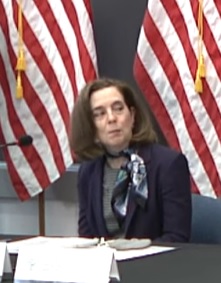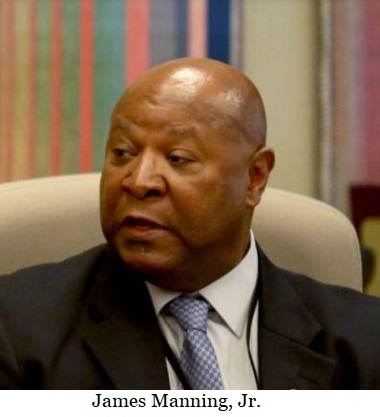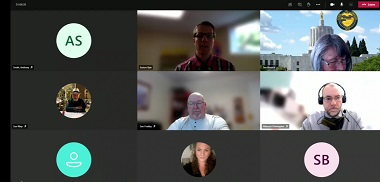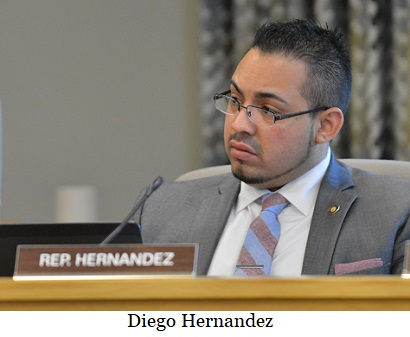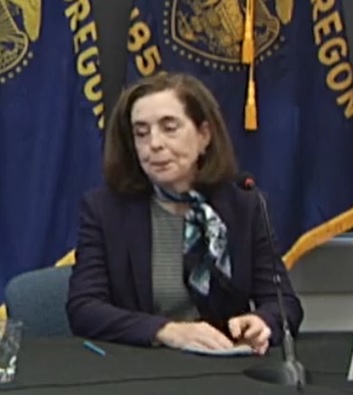 Post an Event
Post an Event
| Benton County Republicans’ Private Fundraising Event, “Bent-on Boots and Bling” with Trey Taylor |
| Friday, September 5, 2025 at 5:00 pm |
| Featuring Trey Taylor
Music Private Event
Friday, September 5, 2025 5:00-5:30 pm VIP Reception
5:30-8:00 pm Heavy Appetizers,
Auction, Concert
Red: $750 VIP Reception
Front Row Table Sponsor
White: $500 Table Sponsor
Blue: $50 per person
Limited Seating. Get Yours Now!!!
Support Local
Dress up: Bling, Cowboy, Patriotic Benton County Republican
FUNDRAISER
www.BentonGOP.org
Get your tickets today at:
https://www.bentongop.org/event-details/benton-county-republicans-fundraiser/form
About Trey:
Trey is the youngest African American Man in Country Music History. The Denver Post wrote
"It's impossible to miss his enthusiasm. With a fondness for cowboy boots, gaudy colors and dazzling jewelry, Trey Taylor could stand toe to toe with any of the Pop, Country or even Rap
contemporaries of his generation.“ |
| Trysting Tree Golf Club, 34028 NE Electric Rd., Corvallis |
Including “equity and racial justice directorâ€
Governor Kate Brown has announced several staffing changes, including the appointment of See Eun (pronounced "she-in") Kim as executive appointments director, effective February 9.
In this role, she will engage with a variety of stakeholder groups across the state to identify qualified candidates to serve on Oregon’s more than 250 boards and commissions, while balancing their needs and goals with demographic considerations such as geography, race, ethnicity, age, gender, military status, and experience.
"I am pleased that See Eun is joining my office as executive appointments director, especially as we work to build diversity among our state boards and commissions," said Governor Brown.
Kim comes to the Governor's Office from the Coalition of Communities of Color (CCC). In this role, she established pipelines in county and state government, business, and non-profit industries in Oregon and worked to position CCC as the resource hub for BIPOC leaders in Oregon. Prior to this, her professional experience includes positions with the New Leaders Council and Medical Teams International. She is a graduate of the University of Oregon.
Kim fills the vacancy created by the departure of Mary Moller.
In addition to Kim's appointment, the Governor announced the following changes to her policy staff.
Shannon Singleton has been named as director of equity and racial justice, filling the vacancy created by the departure of Sophorn Cheang.
A D V E R T I S E M E N T

A D V E R T I S E M E N T
Singleton currently serves as the Governor's housing policy advisor and co-coordinator of the Governor's Racial Justice Council.
Prior to joining the Governor's Office, she was the executive director at JOIN, a nonprofit organization in Portland. She has a background in social and racial justice work and has served on boards of community organizations and nonprofits.
Singleton received her degree from Portland State University, where she teaches Social Work. This appointment is effective February 22.
Linda Roman will serve as policy advisor for the Racial Justice Council.
Roman currently serves as the Governor's health policy advisor and previously served as the deputy health policy advisor and deputy legislative director. Prior to her work in the Governor’s Office, Roman held roles with the Oregon Latino Health Coalition and the Oregon Health Equity Alliance. She holds a bachelor's degree in political science from the Hatfield School of Government at Portland State University. This appointment is effective February 22.
Kristin Sheeran, the Governor's climate and energy policy advisor, will add transportation to her portfolio, effective immediately. Sheeran joined the Governor's Office in 2017. Her career includes positions in government affairs and academia.
--Bruce Armstrong| Post Date: 2021-02-04 23:12:55 | Last Update: 2021-02-04 23:33:19 |
Bill supports illegal aliens
Ganging up on employers, Senators Deb Patterson (D-Salem) and Sara Gelser (D-Albany) introduced
SB 569. Their idea of fair employment practices is to make it unlawful for an employer to require an employee or prospective employee to possess or present a valid driver's license as a condition of employment or continuation of employment.
It’s a short bill with a big punch at the free market
It is an unlawful employment practice for an employer to:
(a) Require, as a condition for employment or continuation of employment, an employee
or prospective employee to possess or present a valid driver’s license unless the ability to legally drive is an essential function of the job or is related to a legitimate business purpose.
(b) Refuse to accept from an employee or prospective employee, as an alternative to a
driver’s license, any other identification documents that are deemed acceptable for the purpose of forms prescribed by the United States Citizenship and Immigration Services that are used for verifying the identity and employment authorization of individuals hired for employment in the United States.
The pandemic has left unemployment high and employers need options to recover in the free market. Both Senators Patterson and Gelser’s Districts have a 31 to 33% non-white population, which makes up 94% of their unemployed. Patterson’s district has 17,900 unemployed and Gelser’s district has 5,404 unemployed. The best and most credible ID a person has is their driver’s license. What do law enforcement ask for at a traffic stop?
The bill is driven by a desire to help illegal aliens compete in the employment market.
SB 569 attacks an employer's ability to run their business efficiently using the DMV’s work for an eligible employee. DMV records are used by auto insurance companies for rating the cost of car insurance, and as a source for voter registration. So why isn’t it good enough for a business owner?
 
--Donna Bleiler| Post Date: 2021-02-04 20:36:37 | Last Update: 2021-02-05 08:46:53 |
“The next place protesters may go is McMinnvilleâ€
The McMinnville City Council
met on January 26 and passed a resolution penned by Mayor Scott Hill which condemned White Supremacy and blamed it for the insurrection at the Capitol Building in Washington D.C. on January 6th of this year.
Voting for the resolution were Council President Remy Drabkin, and Councilors Sal Peralta and Zack Geary. Opposed to making the resolution were Councilors Chris Chenoweth, Kellie Menke and Adam Garvin. Mayor Hill broke the tie voting for the resolution.
Chris Chenoweth read a prepared statement which captured the arguments for city council to oppose the resolution. He first condemned racism and violence saying they were never OK. But the resolution traps a bipartisan body into politically biased position. The march in D.C. was not racial, it was nationalism. Municipalities should not throw gas on the fire of state and national unrest. Council President Remy Drabkin agreed that the council should stick to the business of managing basic services and not involve staff time in out of area activities.
Sal Peralta favored the resolution “or the next place protesters may go is McMinnvilleâ€. He seems unaware that similar language gave BLM and Antifa the attention they craved to “protest†in nearby Portland. Adam Garvin stated that state and national politics is not the concern of the McMinnville City Council. Chenoweth added to his earlier remarks saying to back the resolution opens the door for constituents to demand partisan positioning of this bipartisan body in the future.
At that point Remy Drabkin withdrew her motion. Zack Geary then picked up the banner and restated the motion which Sal Peralta seconded. Remy Drabkin then joined in support of the resolution because her “ancestors had been persecuted by the Nazisâ€. Mayor Scott Hill, in a Ted Wheeler like move, broke the tie to pass the resolution, prepping the battlefield for expansion to McMinnville.
--Tom Hammer| Post Date: 2021-02-04 10:36:24 | Last Update: 2021-02-04 10:42:35 |
Strict regulations to replace “Acuity-based staffingâ€
Just when you thought your grandparents in residential care facilities will get the best care, in steps Senators Deb Patterson (D-Salem), Sara Gelser (D_Albany) and James Manning Jr. (D-Eugene) joining forces to introduce
SB 714 that removes that individualized care and establishes a minimum staffing ratio for residential care facilities and facilities with memory care endorsements.
ORS 443.432 (1) was enacted in 2017 states: “The Department of Human Services shall develop or obtain, maintain and use, in collaboration with residential care facilities, an objective, technology-based, acuity-based staffing tool.†The law suggests an individualized “acuity-based staffing tool†that best serves that particular residential care facility. It’s a partnership arrangement for the best care based on the needs of current residence, with flexibility for specific evaluation for special scheduling based on residents’ needs.
“Acuity-based staffing tool†is industry defined as the allocation of clinical expertise and caregiver resources necessary to ensure a resident’s quality of care/life, based on their medical complexity, ADL dependency and behavior challenges, as determined by a formal assessment process.
SB 714 removes the flexibility for special scheduling and creates a one-size-fits-all schedule. It allows a residential care facility to avoid the partnership and the acuity-based staffing tool that evaluates the needs of residents, and use the minimum staffing ratio of no less than one awake caregiver for every:
(a) Seven residents from 7 a.m. to 3 p.m.
(b) Nine and one-half residents from 3:01 p.m. to 11 p.m. and
(c) Seventeen residents from 11:01 p.m. to 6:59 a.m.
The residential care facility may have no less than one direct care provider for every:
(a) Five residents from 7 a.m. to 3 p.m.
(b) Nine and one-half residents from 3:01 p.m. to 11 p.m. and
(c) Ten residents from 11:01 p.m. to 6:59 a.m.
SB 714 drifts away from the acuity-based staffing tool that was the focal point of enacting OAR 443.432 that incorporated the industry definition to ensure families that their loved ones receive the care and attention they need.
--Donna Bleiler| Post Date: 2021-02-04 07:33:29 | Last Update: 2021-02-02 21:48:24 |
This seems like a good time to expand school choice, not restrict it
As Governor Browns makes noises about opening public schools, parents continue to be discouraged and are looking for alternative education options. Representative Marty Wilde (D-Eugene) wants to limit their options. He has sponsored
HB 2195 prohibiting student from enrolling in virtual public charter school located in school district in which the student is not a resident if student's resident school district or education service district offers appropriate online instruction.
HB 2195 reads:
A student may not enroll in a virtual public charter school that is not located in the school district in which the student is a resident if the school district in which the student is a resident, or the education service district that serves that school district, offers appropriate online instruction and space is available for the student in that instruction. For purposes of this paragraph, online instruction is appropriate if the instruction is provided:
(A) Primarily online, with no more than 10 hours of instruction per five-day week provided to students at a common physical location; and
(B) For the grade in which the student is enrolled.
Applies first to 2022-2023 school year, with exception for students who are already enrolled in virtual public charter schools and who would be enrolled in grade 12 for 2022-2023 school year.
If school is not available, then out of district enrollment must receive approval if more than 3% of students are enrolled outside the school district. This has led some to homeschool along with the lack of choice and lack of adequate instruction during the pandemic. By putting more restriction on school choice, it will encourage parents to continue homeschooling. One father told Northwest Observer that they withdrew their son from public virtual school because he wasn’t learning anything. They have found that homeschool courses are more vigorous. He commented that the 10 hours of instruction per five-day week is not adequate.
Michaela Hammerson told Northwest Observer, “the quality of public school online was awful (March-June). My oldest (a sixth grader) is a TAG student. Before the pandemic he was not being challenged. After COVID-19 started, he learned nothing.â€
On the brighter side, Representative Jack Zika (R-Redmond) introduced
HB 2716 that increases the 3% to 8% of students in a school district who may enroll in virtual public charter school not sponsored by the school district without receiving approval from the school district.
Hammerson said school was delayed opening for her kindergartner, “At the beginning of the year we were rejected by multiple charters due to limits on enrollment. We ended up having to purchase online curriculum to get my Kindergartner in consistent school this year. We need more options. Online charters already have this remote learning figured out. Let them teach!â€
A D V E R T I S E M E N T

A D V E R T I S E M E N T
Public schools have had the tools to plan for online/remote learning for years. Each student has a laptop and many districts provide low-income families with internet for free. Hammerson said, “It's disappointing that they didn't use those tools until we reached a crisis. Alternatively, many charters were proactive and are now better prepared to teach than public schools.â€
Increasing school choice may also improve the public options if competition is taken seriously by public schools and school districts or more parents will look elsewhere for education options.
--Donna Bleiler| Post Date: 2021-02-03 16:32:23 | Last Update: 2021-02-03 17:36:24 |
“This is a full-on assault on working families looking to recoverâ€
Today, the Senate Committee on Finance and Revenue, Chaired by Senator Ginny Burdick (D-Portland), had a public hearing on an amendment to
SB 137, which would repeal certain tax relief provisions from the state tax code. Because the Oregon and federal tax code are connected, the amendment would repeal important measures passed in the federal CARES Act meant to ease the burden of lock-downs that devastated working families and small businesses.
“The CARES Act and federal relief was designed to help working families and businesses make ends meet, not be siphoned off to state government,†said Senate Republican Leader Fred Girod (R-Lyons). “Make no mistake: this is raising taxes on businesses during a time when they need our help the most. Our small businesses have sacrificed a lot in the name of public health. Doing away with this assistance would create even more uncertainty for working Oregonians.â€
“This amendment is a full-on assault on working families looking to recover,†said Senator Lynn Findley (R-Vale), Assistant Republican Leader and member of the Finance and Revenue Committee. “In the middle of a pandemic, Oregonians can’t afford for lawmakers to be messing with important tax relief that the CARES Act provided for working families. As proposed, this amendment would even increase taxes on small businesses that are losing money because of lock-downs.
“Oregon’s economic recovery is far behind the rest of the country. Major tax increases on working families and employers would stall the recovery, slow hiring, and ultimately deprive the state of revenue in the long run. The best way to bring revenue into the state is a safe and rapid reopening of Oregon businesses. Senate Republicans are committed to returning livelihoods to working families.â€
A D V E R T I S E M E N T

A D V E R T I S E M E N T
Oregon has had a continuing connection ("rolling reconnect") to the federal definition of taxable income since tax year 2011. Other ties to federal tax law must be updated on a regular basis, with December 31st being the usual connection date. Over the past forty years, the state has rotated between a policy of automatic connection to federal tax base changes and connection to the federal code at a particular point in time.
Oregon lost 25,500 jobs in December, raising unemployment to 6.4%, a 7% increase from November’s number. The leisure and hospitality sectors have been devastated, with 28,600 jobs lost in December alone. The United States has recovered 56% of the jobs lost during the pandemic, while Oregon has only recovered 37% of its jobs lost during the pandemic.
--Staff Reports| Post Date: 2021-02-03 16:19:37 | Last Update: 2021-02-03 16:32:23 |
Conduct Committee Upholds Violation of Legislative Personnel Rules
Representative Diego Hernandez was found to have violated several Legislative rules on Personnel by the House Committee on Conduct. The Committee consists of two Democrats, Representatives Julie Fahey (D-Eugene) and Tawna Sanchez (D-Portland) and two Republicans, Ron Noble (R-McMinneville) and Raquel Moore-Green (R-Salem).
Tearful testimony was provided by "Subject Two," a person who had, but attempted to end, a relationship with Representative Hernandez. She detailed several attempts to end the relationship and how Hernandez persisted and used his position to pressure her.
According to the
investigator's report,
Subject Two stated that Rep. Hernandez was verbally aggressive in connection with her work at the Capitol after their intimate relationship ended. Rep. Hernandez denied this. As set forth above, Subject Two stated that she was uncomfortable and felt unsafe doing business at the Capitol (either in-person or virtually) due to the abusive nature of her relationship with Rep. Hernandez.
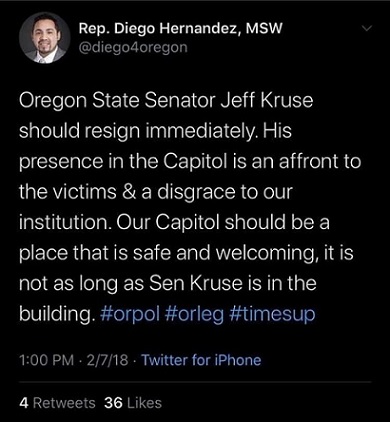
At one point during the work session, in which the committee members voted on Representative Hernandez's conduct, Chair Julie Fahey remarked that the lack of discussion did not indicate a lack of interest, but instead indicated that the offenses were so clear-cut. Committee members voted unanimously on all of the nearly all of the factual and conclusive allegations against Hernandez.
Hernandez has
contended that the committee has been driven by the political agenda of House Speaker Tina Kotek (D-Portland)
The committee will reconvene tomorrow, Wednesday, February 3 at 5:30pm. In the past, Hernandez has been vocal on social media regarding the conduct of Republicans.
--Staff Reports| Post Date: 2021-02-02 19:17:51 | Last Update: 2021-02-02 19:47:38 |
The negative economic impact to these communities will be extremely challenging
Governor Brown has taken steps to close three Oregon correctional facilities over the next two years:
- Mill Creek in Salem
- Shutter Creek in North Bend
- Warner Creek in Lakeview.
According to State Representative E. Werner Reschke, the negative economic impact to these communities will be extremely challenging. Representative Reschke is against closure and states his strong support for keeping Warner Creek Correctional Facility open.
“The political leadership remains in favor of closing Warner Creek Correctional Facility by mid-2022. I am strongly committed to making it clear to the Governor and legislators in Salem that closing Warner Creek Correctional Facility is a grave mistake for several reasons,†said Representative Reschke. Reschke has joined Senator Findley in Chief Sponsoring
SB 19, which upon closure would transfer Warner Creek Correctional Facility to Lake County and allow the county a one-time land use change. This allows the county to use the building, or find a private entity to lease or buy the facility.
“While
SB 19 does not immediately replace all the lost jobs due to a prison closure, it
provides a far better future for Lake County than the State’s plan of shuttering the facility for non-use,†said Rep. Reschke.
--Staff Reports| Post Date: 2021-02-02 18:30:37 | Last Update: 2021-02-02 19:17:51 |
Will be considered on February 23
Governor Kate Brown has submitted a list of state board and commission appointments to the Oregon Senate for confirmation.
The Senate Rules Committee is scheduled to consider the nominations on February 23.
“State board and commission members bring a diverse set of backgrounds and life experiences to address a wide range of issues facing state government," said Governor Brown. "Their contributions help lead to policies and strategies that better enable us to serve and represent all Oregonians. I appreciate the willingness of all these nominees to serve our great state and help make it better for all those who call it home.â€
A D V E R T I S E M E N T

A D V E R T I S E M E N T
The full list is available
here.
These submissions from the Democrat Governor Kate Brown are likely chosen as they have similar political opinions as the Governor, whose one size fits all approaches to Oregon's problems aren't always the most popular.
--Bruce Armstrong| Post Date: 2021-02-02 17:54:52 | Last Update: 2021-02-02 19:13:50 |
Corporations will be required to file the diversity information with the Oregon Secretary of State
HB 3110 would force publicly traded corporations based in Oregon, to change the makeup of their board of directors to meet new requirements. The bill has been introduced by Representatives Karin Power (D-Portland) and Janelle Bynum (D-Portland) and Senator Deb Patterson (D-Salem).
“Requires board of directors of publicly traded corporation to have specified proportion of female directors and directors who are members of underrepresented communitiesâ€.
Also, a female board member cannot also represent the other position representing underrepresented community. In other words, an individual who identifies as African American and identifies as a female, cannot meet the legislative requirement for both categories under
HB 3110 rules.
The corporations will be required to file the diversity information with the Oregon Secretary of State annually. If they do not, they will be subject to a $100,000 fine. In addition, if the new diversity seats on the board are vacant for an 8-month period, they will be fined $100,000 for each seat vacant. Subsequent violations will be in the amount of $300,000 per violation.
The bill gives publicly traded companies until January 1, 2022 to fill these seats and fines will start to be implemented January 1, 2023.
Oregon has many corporations that started out as family businesses, sole proprietorships or partnerships that are now publicly traded companies. Several of them have legacy family members that sit on the Board of Directors. Other board of director members often include COE’ of other companies, experts in their field related to the business sector or past executives of the company. In looking at some of the larger ones based in Oregon there is Nike, Inc., Precision Castparts, Corp., Columbia Sportswear and even Willamette Valley Vineyards. They cover a gamut of industries and have presence in the domestic and world markets. Should these companies be required to elect board members based on anything other than their ability to manage and make the company and its shareholders increased returns on their investments?
--Terese Humboldt| Post Date: 2021-02-02 17:52:21 | Last Update: 2021-02-02 20:36:37 |
Mandated via Public Health Director Banks
The State of Oregon now requires health benefit plans in Oregon to cover costs of vaccination for COVID-19, following an order by state Public Health Director Rachael Banks.
The Jan. 27 determination cites
Oregon Revised Statute 743A.264 (2) and (3) in mandating that private health plans operating in Oregon not charge patients for most costs related to providing the vaccine. That includes the cost of all doses of the vaccine and associated supplies, and expenses for administering the shot, such as those related to staff time.
The Oregon Health Plan and Medicare programs supposedly do not charge patients for costs of vaccinations.
“We are in the midst of a devastating pandemic that has affected more than 142,000 people in Oregon and claimed almost 2,000 lives,†Banks said. “There should be no financial barrier to getting the vaccine, whether it’s a copay or administrative fee. Even small costs can be a big burden for people with limited resources, particularly considering the economic challenges people have faced for the last year.â€
A D V E R T I S E M E N T

A D V E R T I S E M E N T
She said she encourages providers to bill patients’ insurance for any vaccination costs and avoid asking or expecting patients to cover vaccine administration costs.
In her order, Banks points to “two safe and effective COVID-19 vaccines that are currently approved by the U.S. Food and Drug Administration (FDA) under Emergency Use Authorization.†Both vaccines — one made by Pfizer-BioNTech, the other by Moderna — “are currently available to eligible individuals in Oregon. More COVID-19 vaccines may become available following clinical trials and approval by the FDA.â€
Therefore, the order continues, “having determined there exists a disease outbreak and that vaccination is necessary to prevent the spread of COVID-19, the cost of vaccination for COVID-19 shall be covered by insurance …â€
--Bruce Armstrong| Post Date: 2021-02-02 12:12:15 | Last Update: 2021-02-02 17:54:52 |
Will provide better forest management
America’s national forests need our help. Our public lands are burning at an alarming rate and need forest management to reduce the risks of devastating wildfire, insect infestations and disease. In 2020 alone, over 4.9 million acres burned on U.S. Forest Service-protected lands. That’s nearly the size of Delaware and Connecticut, combined.
To protect our communities, wildlife habitat, recreation, clean air and water, the federal government must allow its professional land managers to do their jobs. Help is on the way. The U.S. Fish and Wildlife Service has proposed a new rule that will limit frivolous lawsuits that seek to block projects designed to reduce the risks to our forests.
What does this new rule do? It provides relief from harmful anti-forestry lawsuits that have blocked efforts to thin overstocked forests and reduce fuels that are contributing to these devastating fires. This solution is bipartisan. It reflects efforts by both Democratic and Republican administrations and members of the U.S. Congress to resolve lawsuits over duplicative interagency consultation procedures that have prevented work from being done on public lands.
Public comments on the rule are due by February 11.
--Staff Reports| Post Date: 2021-02-02 10:36:24 | |
Read More Articles






